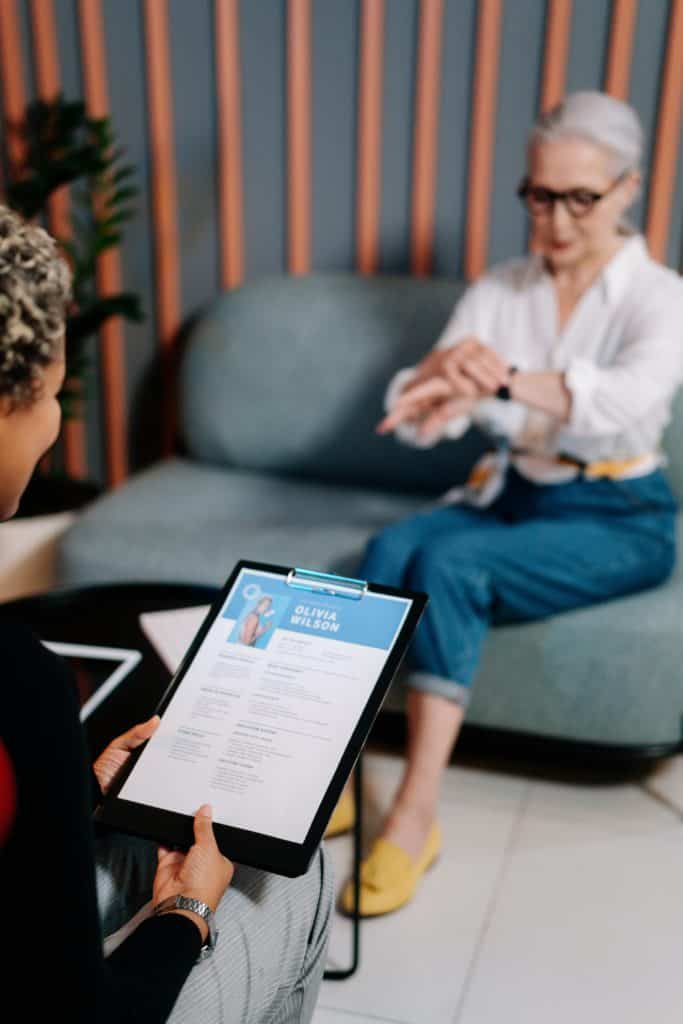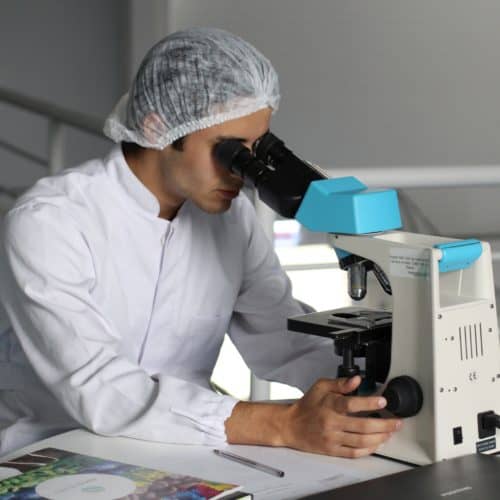
The students I work with often ask me how to prepare for MDPhD interviews. Having gone through the interviewing process and worked with countless students on preparing for interviews, here are my tips and strategies to ace them.
What to Expect on Interview Day
I remember how nerve-racking the weeks were leading up to my first MD-PhD interview. Frankly, I didn’t know anyone who went through the MD-PhD process so I had very little idea of what to expect. I went into my interviews with a vague sense of what to expect based on my internet search and how to prepare for MDPhD interviews.
Length
MD-PhDs are typically 2-3 days long and there is a mix of informational sessions, student and faculty interviews, and breakfast/lunches/dinners. Here’s a sample itinerary that is representative of some places that I interviewed at:
| Day 1 | |
|---|---|
| 4:30 pm | MSTP Presentation |
| 6:00 pm | MSTP Welcome Dinner |
| Day 2 | |
|---|---|
| 8-8:45 pm | Welcome Breakfast |
| 9-noon | Four MSTP Interviews |
| Noon | Lunch |
| Noon-3:30 pm | Two medical school interviews |
| 3:30-5:30 pm | Medical School Presentation and Tour |
| 5:30-6:30 pm | Interview wrap-up |
| 6:30 pm | Dinner with current MSTP students |
| Day 3 | |
|---|---|
| 9 AM | Optional Dinner |
Medical School Interviews
Notice in the itinerary that there are medical school interviews and MSTP interviews. At this particular institution (as with most of the programs that I interviewed for), you interview with someone who is representing the medical school admission committee. In this interview, your answers should be more focused on your interest in seeing patients and clinical medicine. Remember that you are getting BOTH an MD and Ph.D. – you wouldn’t want to come off with the MD being an afterthought. The interviewer will be assessing whether or not you have potential as a future clinician.
Research Interviews
Research interviews are often with the faculty members that you indicated on your secondaries as ones that you are interested in talking with. The program will do its best to pair you with the people you indicated an interest in. You will also interview with an MD-PhD program director and likely a current MD-PhD student.
At this particular program, I had six interviews. I remember the four MSTP interviews feeling like a marathon and I definitely felt exhausted. However, even if you feel exhausted it’s important to be just as enthusiastic and engaged as your first interview.

Meals
All of the programs provided meals. One of my favorite parts was the opportunity to go to new cities, eat at restaurants, and try the local food with the current students. I ate so much delicious food during those interviews. The most memorable dinner spot during interviews was a Spanish tapas place. We shared everything family-style and there seemed to be an endless stream of dishes!
It’s important to make a good impression during your dinners. It’s also a great opportunity to interact with the current students to see if they fit into the program.
Transportation, Housing, and Food:
Some programs may provide some financial support for your transportation to the interview. Additionally, they may offer housing with current students which are free. If you get a chance to stay with current students, I recommend doing this. It’s a great way to connect with the current students and gain additional insights about the program and student life that you may not otherwise gain. After staying with a student host at my current institution, I knew that this MD-PhD program would be my top choice!
Interview Questions
When I was interviewing, I came across the following four most common questions that I recommend preparing for MD-PhD interviews:
- Tell me about yourself
- Tell me about your research
- Questions specific to your application, including work/activities and research
- Why MD/PhD?
Tell me about yourself
“Tell me about yourself” is the most common way that interviewers lead into the interview. It is one of the most common interview questions, not just for MD and MD-PhD programs. The very general invitation to talk about yourself is challenging given how broad and open-ended it is. After all, what detail and how much do you delve into your entire life story?
Here is a great resource on how to tackle this particular question. It is worth investing time to prepare your response beforehand as, in my personal experience, this was the most common interview question that I got during interviews.
Questions about research:
Know your research like the back of your hand
Questions about your specific research topic can be quite random, depending on whatever catches your interviewer’s eyes. However, everything on your application is fair game. Even if it’s the one you don’t want them to ask because you barely remember it since it was so long ago. Based on my experience when I was on the interview trail, I found that the types of questions will vary by interviewer.
If it’s someone without much expertise in your field of research, they may ask general questions such as “big picture” ideas and a general overview of what you did. If your interviewer is an expert in your research area then they may delve into granular aspects of your research. I’ve had researchers ask me about a specific protein and its function. I’ve also been asked by interviewers how I test something.
Given the variety of questions asked regarding the research experiences that you’ve written down, it’s a good idea to do some literature review to be up to date with what’s going on. Also know the research like the back of your hand and understand not just what you did but why you did it. While knowing the details is important, it is also crucial to be able to communicate the “big picture” idea.
Review previous works on your project
To prepare to talk about my research, I not only reviewed what I wrote in my primary and secondary applications but also the posters and papers I wrote for the particular project. I also took a look at relevant papers from the laboratory that I conducted research to better contextualize the research topic.
Research your interviewer if possible
In some cases, you may receive your interview itinerary beforehand with the name of the interviewers. Sometimes, I would do a quick google search on the interviewer, their research topic, and skim some of their recent articles. This would give me some sense of their level of expertise in my area of research. It also helped me prepare questions to ask them about their research.
If you don’t know the question, just admit it
It is inevitable that there will be some questions that you’ll be asked that you can’t answer. Do not make up an answer. Rather, share that you do not know and that it’d be something that you will look into.
Question about work/activities
Just as the research experience that you wrote down is fair game, so are the experiences you detailed in the work/activities section. The specificity and variety of questions will vary by the interviewer.
Also, keep in mind that some interviewers may have reviewed your application in-depth while others did not even look at it. This may be reflected in the types of questions that they ask you during the interview. Some you may feel like you are just restating your application while others you may be getting down to the nitty-gritty details or expanding on what you already indicated in your written application.
Why MD-PhD?
The MD-PhD is a huge commitment from not only your end but also the institution. After all, most programs provide full tuition waivers, stipends, and basic health insurance. The admission committee wants to know that you are aware of what the MD-PhD training will entail and demonstrate that you have thought about this decision thoroughly.

AAMC Questions:
The following is a list of questions provided by the AAMC.
- What academic or non-academic experience shaped your decision to pursue an MD/PhD dual degree?
- When did you initially discover that you wanted to pursue a career in medicine and research?
- What are some obstacles that you have overcome to arrive at this point?
- If you could improve any aspect of your application, what would it be?
- What elements of your previous research training would you like to build upon during your training as an MD/PhD student?
- Share some qualities/attributes that you possess that will allow you to balance life as a physician scientist?
- What are some qualities in our program that you feel will prepare you for a career as a physician scientist?
- Describe the most exciting moment in your research experience thus far?
- What experiences do you believe will aid in your development as a well-rounded physician scientist? Do you feel that this program will offer you these opportunities?
- What is the one thing you want me to convey to the admission committee?
- How do you see the field of medicine changing in the next ten years?
- How do you see yourself fitting into those changes?
- What do you think you will find most difficulty about medical school?
- Describe a past stressful experience? How did you handle the pressure? Would you have done anything differently?
- Share aspect(s) of research excited you the most?
- What is a valuable lesson you learned while working under your research mentor(s)?
AAMC General Interview Tips:
The following are tips provided by the AAMC.
- Smile and make eye contact. Don’t underestimate the power of positive body language!
- Maintain a positive attitude throughout the day.
- Actively engage with interviewers and other interviewees.
- Active engagement reflects your enthusiasm and desire to join the program.
- Be prepared for certain questions but do not over-rehearse. You want your responses to sound like normal conversation and not like a memorized script.
- Be prepared to discuss your research. Be able to answer questions and demonstrate your critical thinking ability. And potential for and interest in research.
- Be able talk about any experience listed in your AMCAS application, even if it occurred a number of years ago.
- Anticipate questions about things in your record that may concern the interviewer.
- Be prepared to talk about an interviewer’s research. This is particularly important if you requested to meet with a specific person. It is important that you have some knowledge about the interviewer’s current research interests, especially if you requested to meet with him/her. Do your homework.
- Show motivation for dual degree. Interviewers want to weed out those looking for a “Free MD”.
- Have questions of your own about the program.
- Engage in conversation with your fellow applicants in between interviews and during the breaks. This will help reduce some of the interview day stress. Also, you can start to become acquainted with potential future classmates. Do they seem happy and positive about their experience in the Program?
Virtual Interview Tips:
It is important to prepare for your virtual interview such as you would for an in-person interview.
- Practice, practice, practice
- Prepare questions to ask your interviewer beforehand
- Pick out your interviewing spot
- Pick out your professional outfit
- Do research on the school
- Check the audio and visual quality of your audio on the day of
- Be engaged and enthusiastic
- Send thank you notes or emails to interviewers if possible
I go more in-depth on how to prepare for virtual interviews in this article:


